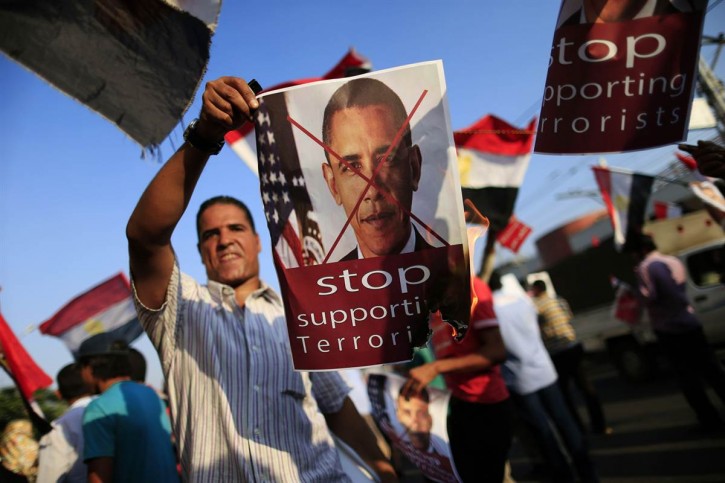The United States squanders approximately $50 billion annually in economic and military assistance abroad. This extravagant folly should stop. The recipient foreign leaders become ingrates; their rivals become enemies; and, the money or weapons do nothing to nudge the foreign nations towards democracy or support for the United States.
Videos By Rare
Egypt is exemplary.
Following the assassination of Anwar Sadat in 1981, Hosni Mubarak served as Egypt’s president for 30 years until his overthrow in 2011. The United States showered billions of dollars of economic and military assistance on President Mubarak despite his contempt for human rights and the rule of law. Political rivals were persecuted. Elections were manipulated. Freedom of speech, association, and religion were denied. Corruption flourished. State-controlled enterprises caused economic stagnation. All power was concentrated in the presidency.
President Mubarak also did nothing to promote the foreign policy interests of the United States that he would not have promoted if he had received neither money nor arms. Indeed, Egypt consistently voted against the United States at the United Nations. As Great Britain’s Lord Palmerston taught, “Nations have no permanent friends or allies, they have only permanent interests.” The Suez Canal remained open because it boosted Egypt’s economy. The peace treaty with Israel was maintained because Egypt’s military was vastly outmatched by the Israel Defense Forces. Mubarak cooperated in counterterrorism endeavors because his own regime was threatened by jihadists.
Egyptian international terrorists spawned by our material support for Mubarak’s corrupt and tyrannical rule include Sheik Omar Abdel Rahman and Ayman al-Zawahiri. The former was convicted of plotting bombings and assassinations in the United States to force a break in our support for the governments of Egypt and Israel. The latter is currently the head of Al Qaeda.
Mubarak was succeeded by President Mohamed Morsi, championed by the Moslem Brotherhood. Despite the continuing flow of United States assistance, Morsi was deaf to United States pleas to respect minorities, human rights, and the rule of law. Morsi in turn was ousted by the Egyptian military supported by a decisive portion of the population. President Barack Obama evaded a statutory requirement to terminate Egyptian aid by refusing to characterize the military coup d’etat as a coup. But Mr. Obama’s attempt to push Egypt’s current military dictator Abdul Fattah el-Sissi towards democracy by withholding some aid and threatening greater cuts elicited General’s el-Sissi’s scorn. He avowed that Egypt would not tolerate pressure “whether through actions or hints,” and has refused United States exhortations to yield to free and fair elections, freedom of association, and due process of law.
The more things change, the more they stay the same.
In any event, Egypt’s internal developments are irrelevant to the United States. Egypt is not and never has been a military threat. Its miniscule economy has no bearing on United States prosperity. If Egypt succumbs to internecine warfare, no material interest of the United States would be affected. And if the United States refrained from attempting to manipulate or control domestic politics in Egypt with financial assistance or weapons, bilateral relations would not become antagonistic.
No nation incurs the wrath or enmity of another nation or other peoples by leaving them undisturbed. It would be unnatural and contrary to experience and human nature for Egyptians (dwelling thousands of miles from United States shores) to take action against the United States for letting them determine their own destiny. Egyptians and other foreigners understand that we are under no moral obligation to cure or mitigate evils abroad we had no hand in making.
The example of Egypt has been repeated throughout the Middle East with great injury to the United States. For more than sixty years, the United States has attempted to control or manipulate political developments in Israel, Saudi Arabia, Iraq, Iran, Jordan, Syria, Oman, Yemen, and the Persian Gulf statelets by wars, coups, financial aid, or military support. We have provided material assistance to tyrannical or oppressive regimes that has predictably awakened in the oppressed resentment or hostility towards the United States which found expression in the criminal horrors of 9/11 and related terrorist abominations.
In sum, if there are any worse returns on investment than United States foreign aid, they do not readily come to mind.
Bruce Fein is a lawyer who specializes in constitutional and international law. Fein has written numerous articles on constitutional issues for The Washington Times, Slate.com, The New York Times, Legal Times, and is active on the issues of civil liberties. He has also worked for the American Enterprise Institute and the Heritage Foundation as an analyst and commentator.
Fein is the attorney for Lon Snowden, father of whistleblower Edward Snowden.
Related articles
- Egypt: Obama threw relations into turmoil (rare.go-vip.net)
- Egypt: Relations with United States in ‘turmoil’ (miamiherald.com)
- Egypt criticizes US decision to halt military, economic aid (jpost.com)

